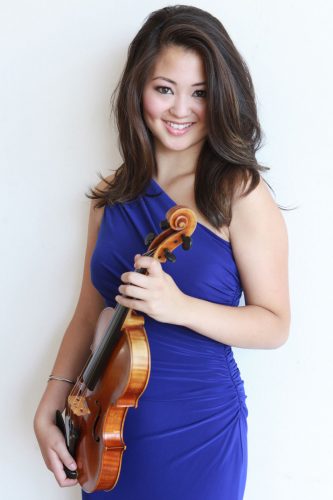
From Joseph Joachim to Jascha Heifetz to Itzhak Perlman to Joshua Bell and so many more, solo violinists have been the closest things to rock stars in classical music. Star pianists like Liszt and Glenn Gould and Van Cliburn might argue, but as even flamboyant rock pianists Little Richard, Jerry Lee Lewis and Elton John discovered, it’s easier to flash your chops onstage when you can stand up and move around.
The best-known violin virtuoso in his time was Niccolo Paganini, the early-19th-century Italian phenom whose reputation for flashy performances enchanted audiences but also overshadowed his compositions (for guitar and violin) after he died.
On Thursday, Nov. 16, at the Hult Center, a rising young violin star plays Paganini’s dazzling first violin concerto with Eugene Symphony — and behold, she’s neither European nor male. Simone Porter, a 20-year-old rising star from Seattle, will follow the trail blazed by women like Nadia Salerno-Sonnenberg. The orchestra also plays Dvorak’s seventh symphony and Berlioz’ Roman Carnival Overture.
Speaking of Rome, a couple centuries before Paganini, an earlier Italian virtuoso, Giovanni Kapsberger, made a reputation there for his own virtuosic compositions, mostly for lute and theorbo. Eugene guitarist David Rogers plays some of them in a free show Thursday, Nov. 16, at Jordan Schnitzer Museum of Art, which is displaying famous tapestries that formed the backdrop to some of Kapsberger’s performances.
In our time, classically trained violinists are as likely to front bands (especially country and bluegrass and occasionally jazz) as classical orchestras, like another Seattle-born fiddle phenom, Kishi Bashi, who also plays Thursday, Nov. 16, at the WOW Hall, or Andrew Bird. Another Northwest artist turning a “classical” instrument into a vehicle for contemporary personal expression is Portland Cello Project veteran Anna Fritz, a classically trained cellist and folksinger who’s worked with The Decemberists, My Morning Jacket, Dirty Projectors, and other bands who need a cello on a track.
Fritz’s solo work puts her cello and her supple voice front and center in original songs that often address political concerns, such as climate change and last year’s anthemic “On Wisconsin” (inspired by the state’s recent Republican labor-baiting). Others are more personal, including some with trans characters. She performs Saturday, Nov. 18, at Eugene Friends Meeting, 2274 Onyx Street.
Yet another classically trained cellist, Charles Mingus, became famous as jazz’s most renowned bassist-composer after the racist pre-World War II classical music establishment refused opportunities to a black genius from Watts. But Mingus’ classical studies influenced his later compositions, some of the greatest in American music of any kind, and toward the end of his colorful life, he even returned to writing for classical orchestras. On Friday, Nov. 17, the Carl Woideck Jazz Heritage Project surveys some of Mingus’ magnificent music at The Shedd.
If instead of strings, it’s wind instruments that blow up your skirt, head over to two concerts this week at Beall Hall. UO Wind Ensemble concert on Thursday, Nov. 16, features a wide range of music from late Renaissance composer Jan Sweelinck to 20th-century American masters William Schuman and Karel Husa to contemporary works by Roger Zare and Pulitzer Prize winner David Lang’s pugilistic cheating, lying, stealing.
Then on Saturday, Nov. 18, UO pianist Alexandre Dossin joins fellow faculty wind players to perform some of the loveliest, most charming classical music of the 20th century: French composer Francis Poulenc’s sonatas for flute oboe, horn and piano, plus a sparkling trio with oboe and bassoon and a chamber music masterpiece: Poulenc’s Sextet for piano and winds.